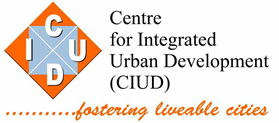Sabita Parajuli, Age 31, Batal, Ugrachandi Nala VDC, Kavre District, Nepal
Sabita Parajuli, Age 31, Batal, Ugrachandi Nala VDC, Kavre District, Nepal
Sabita Parajuli lives in one of the open defecation free (ODF) villages in mountain region of Kavre district. The village was highly affected by the earthquakes of 2015. Now, she and her family (her husband, two daughters and a brother-in-law) are living in a small and clean temporary shelter.
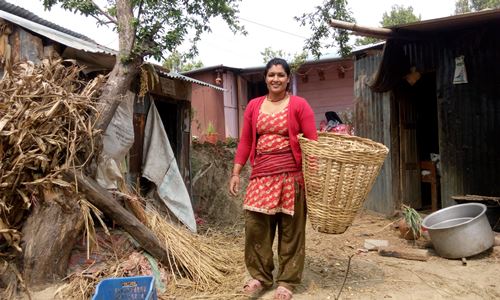
Ms. Parajuli says, “It is quite difficult to have improved sanitation practice after earthquake and use adequate water for personal hygiene. It was more difficult especially for me and my daughters to defecate openly during day time. Me and my family felt uncomfortable and ashamed to defecate in and around open spaces and bank of the river. On such, we had prepared temporary toilet within 2-3 days which made us easy for defecation. After using that toilet for 2-3 months, we felt the need of having our own safe permanent toilet and we started its construction as well with the resources we owned.Most of thepeople in our community also prepared traditional pit toilet from available resources keeping in consideration that the VDC was already declared as ODF zone. In the meantime, CIUD from CIUD’s Nala field office came to our home and community, and took record for toilet supporting list.”
In addition, she said, “Those community people who were not able to construct toilet shared other’s toilet at the time, so after 2-3 days of earthquake none of the community people defecated openly.”
Sabita Parajuli watering the flowers she planted in the garden which she created in her temporary shelter. She is currently living there.
Proudly she said, “This is the consequence of learning as we had participated in water, sanitation and hygiene campaign organized from CIUD in different occasions. Some weeks later, the staffs of CIUD visited us again and handed over me the support as a motivational reward for the construction of our toilet.”
“Now, I feel very much indebted for I got the opportunity to understand about the importance of improved sanitation and hygiene practices by participating in WASH programs conducted by CIUD time to time.”
The Nala village was intervened with water, sanitation and hygiene (WASH) activities from CIUD in assistance from WaterAid Nepal since 2009.
Empowered Woman: A Cause of Change in Community
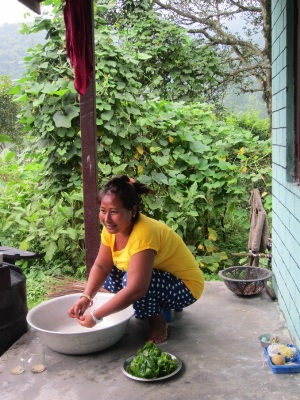 32-years-old Phulmaya Tamang (seen here washing green vegetables) lives in Sisneri-10, in Kamalamai municipality with her 3-years-old daughter. Her husband lives in Kathmandu for business purpose.
32-years-old Phulmaya Tamang (seen here washing green vegetables) lives in Sisneri-10, in Kamalamai municipality with her 3-years-old daughter. Her husband lives in Kathmandu for business purpose.
Before her marriage, her father (a retired Indian army) migrated to that village around 1980s. At that time, none of the communities owned their personal toilet. People defecated openly in fields and forests. As she had spent her childhood in India she was accustomed to using toilet and using safe drinking water. She told, “I practiced them during my student life through lesson learning processes.”
Her focus on self-built water sealed toilet helped her to have a clean and healthy environment. She said, “Gradually, few people followed my practice in their daily life which encouraged me to improve community health and environment.” In the meantime, one of her uncles told her about CIUD which was launching WASH project in nearly half of the wards (ward 10 to 18 except ward 13) of the municipality. She was very excited to hear about it.
“Later, coincidently, as an honour of practicing clean environment and ways of gardening, community people selected me as ‘Volunteer for Water Environmental Sanitation and Hygiene’ representative from ward number 10.” She added, “After being involved in VWESH for the WASH project of CIUD, I got an opportunity to improve hygiene behaviours (hand-washing, environmental sanitation) and it made me realize that unless the community gets healthier I will not be able to have a healthier and a better life”.
Furthermore, with a smile in her face she shared, “I developed skills like leadership, public speaking and time management”. Actively participating within WASH related campaigns she raised her voice and capacitated other women on water, sanitation and hygiene issues in different series of campaign.
|
Phulmaya Tamang sewing home-made menstrual pad in a Pad-Making Training organized by CIUD BeforeWASH project intervention, nearly there were 52.3% households which didn’t own a personal toilet but now it has gradually reduced to 10.2%. This is one of the significant achievements of the project as it is planning to declare project wards as ODF wards in near future. |
“I am even very happy because the people in my community cooperated with me for improving sanitation practices in our community. I am grateful towards CIUD for empowering me on WASH sector and helping me develop my personal skills.”
Sabita Parajuli watering the flowers she planted in the garden which she created in her temporary shelter. She is currently living there.
Proudly she said, “This is the consequence of learning as we had participated in water, sanitation and hygiene campaign organized from CIUD in different occasions. Some weeks later, the staffs of CIUD visited us again and handed over me the support as a motivational reward for the construction of our toilet.”
“Now, I feel very much indebted for I got the opportunity to understand about the importance of improved sanitation and hygiene practices by participating in WASH programs conducted by CIUD time to time.”
The Nala village was intervened with water, sanitation and hygiene (WASH) activities from CIUD in assistance from WaterAid Nepal since 2009.
Ganga Kumari Mudel (in front of wooden pillar of her own home in the picture) from Bhitte Gaun, Hardiya, got married at the age of sixteen. She has two daughters, Nisha (elder) and Jharana (younger). Nisha is now 11 years old, while Jharana has just stepped into 8 with a disability (deaf and dumb). She is an unpaid artist who cares her family and home. She is a literate citizen passing 8thstandard from a government school. She dropped out school after having her second baby.
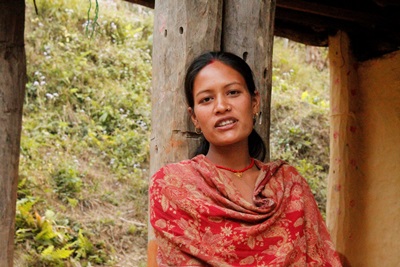
Her 32-year-old husband returned from Saudi Arabia last year and is recently working as a skilled labor (mason) in their local area. As she is aware about the importance of education, she is even planning to send her younger daughter to a ‘school for disabled children’ which is located in Sindhuli bazar. Currently, she studies in a normal school with her elder sister.
Remembering issues on WASH facilities of her own home, she said, “In Bhitte Gaun, there was only one public tap which was shared by around 13 households. The water used to run in the tap for 2-3 hours in the morning and evening. We had to wait for very long time to fill our buckets. Sometimes the water running time used to be over before our turn came. Due to this, we were not able to use sufficient water for household purpose and maintain proper sanitation.”
The community people of Hardiya got support from CIUD to successfully install the Hardiya Water Supply Scheme. CIUD has connected private taps in more than 100 households which runs for more than 8-10 hours a day on tariff basis. She was also a member of that water supply scheme. Since the problem of water is solved, along with Ganga, all the people living in Hardiya are overjoyed and satisfied. Ganga said, “Since we have our own tap now, lots of time is saved as we didn’t have to waste time and efforts in cue to fill our buckets and I can do other works at that time.” She added, “I am planning to start kitchen gardening so that I will not have to buy vegetables from market and I can save some money this way.”
Further she said, “Similar to water, sanitation practices were worst in our community when I first came in this community after I got married. People used to defecate in nearby river and houses which polluted the surrounding environment, contaminated the river water and even induced flies which contaminated the food we ate. CIUD has helped us to improve our sanitation and supported in constructing toilets.” Ganga was made chairperson of Citizen Awareness Committee at that time. Giggling she said, “I myself didn’t own a toilet and had to defecate in open places. Fortunately, the program of CIUD began at the same time. I participated in various WASH related programs organized by CIUD and I realized the importance of use of toilet instead of defecating openly. After that I constructed a personal toilet and it made me easy to convince others to use their own toilet.” Her regular participation in the programs made her aware about different things like importance of water purification, hand washing, menstrual hygiene management and so on.
“Now I realized why we all suffered from frequent diarrhea then.”
Correspondingly, after they were supplied with water, she told that it had made them easier to create clean house and toilet. “My children have learned and practiced washing hands with soap always (mostly in critical periods). This has somewhere supported our livelihood as we didn’t have to spend our money on any medical purposes like before when we didn’t have better water and improved sanitation facilities”, she added.
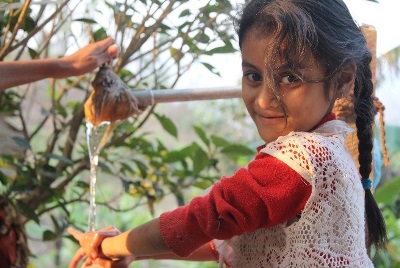
Ganga’s elder daughter (Nisha) washing her hand in their newly fitted personal tap
Ganga said, “I am grateful to CIUD for awareness and facilitation in our community. It took very long time for us to understand the importance of proper sanitation and safe drinking water. There might be more rural places in Kamalamai Municipality with similar situation so I want CIUD to continue doing these good works for the welfare of society in many places and progress a lot.”
A hope of Change in Livelihood
Jeetendra Budhathoki, 26-years-old youth from Bathandchaudi, Kamalamai Muicipality-12 belongs to a low income generating family. He completed his higher education from Janagriti Higher Secondary School (a community school).
Jeetendra( in black jacket and woolen cap in the picture) while working at Hardiya Water Supply Scheme
He is the only son among his eight siblings. Born in a large family and being only son, he was made feel his responsibility towards his family. Therefore he decided to discontinue his further education and seek a job so that he could support his family. On such, he went to Kuwait for two years for plumbing work but unfortunately he wasn’t paid as expected and as committed by the employment agency. Therefore, he decided to come back to Nepal. For some months, he searched for job in several places but couldn’t find a suitable one. In the meantime, he got an opportunity to attend a plumbing training program conducted by Nawa Kantipur in Kathmandu. Even after that, he remained passive because he couldn’t find a suitable job. After some months, he got an opportunity to be involved in Village Maintenance Worker (VMW) training conducted by CIUD in Nala. He recalls, “At that time, field staffs from CIUD provided me the opportunity to participate in VMW training and it happened to be fruitful for me.”

Father (Khojraj Budhathoki, age 54) and mother (Kanta Maya Budhathoki, age 52) preparing raw materials for mushroom farming in the picture.
With a smile he said, “I was jobless but after I was trained as VMW, within few weeks I got an opportunity in nearby district for water supply schemes with pipeline connection and plumbing work.”
Jeetendra was also included as a paid skilled labor in the construction of water supply schemes executed by CIUD. He said, “I am very happy because the project has created job opportunities for youth like me and helped to improve our economic status in one way or another.”
Likewise, before the construction of Bathanchaudi Water Supply scheme, the people of Bathanchaudi had to travel a long distance to fetch water. Jeetendra said, “The completion of this scheme has made our life much easier and saved lots of time.” Since the people didn’t have to walk long distance as before, they have more free time and this has helped people living in Bathanchaudi to be involved in productive works like cattle farming, agriculture and so on for improving their livelihood.
“I was jobless and today I am employed because of CIUD. The organization has not only helped me but also made the life of my community much easier. Therefore, I would like to thank CIUD and Water Aid Nepal for transforming our life.”
“On behalf of the people who are gaining access to safe water and improved sanitation and hygiene practices, thank you. You are transforming lives.”
The Return of Happiness with a New Water Supply Scheme
On 25th April 2015, Nepal was hit by a massive earthquake which was considered to be the most devastating one in the memory of the people living in the severely affected areas. The tremors of the earthquake affected a village Nala, in Kavre district. Though there were very less casualties, most of the houses as well as other infrastructures such as water supply system were destructed fully or partially in the region.
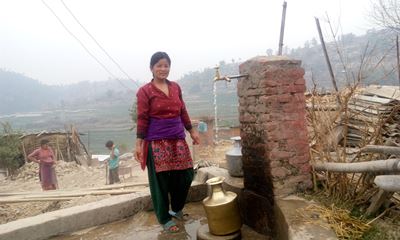
29-years-old Ratna Ramtel, a high school graduate, lives in Bulle community of the Nala villlage with her family. She lives with her husband, a 6-years-old daughter and an 18-months-old son. Like in other places, the earthquakes affected her house, toilet and the water supply scheme. The public water tank, which supplied water to her and her neighbors, was damaged. People faced big problem as there was no any alternate source of water. Ratna said, “Life is impossible without water. If it was only for drinking purpose then we could have managed it somehow, but we needed it for other crucial purposes also.”
They tried to fix the crack in the tank by various techniques, but they failed. Since they were not able to store water with any of their efforts, they were compelled to share water from another community. Ratna said, “It was okay for a week or two, but we were using their water source for several months as we were not able to build our own tank due to financial problem. We felt very awkward fetching water like that for months.”
They requested various organizations for support for rehabilitating their damaged tank. Center for Integrated Urban Development (CIUD) had been working in Nala in WASH sector since 2012. After the disaster, CIUD initiated Nala WASH Recovery Project, in support of WaterAid Nepal, for rehabilitation of WASH facilities which were affected. CIUD constructed new water reservoir tank as a part of recovery project in Bulle, Nala.
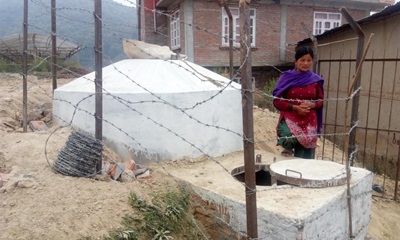
Ratna looked very satisfied, and with a smile in her face, she said, “CIUD helped us build a new Ferro-cement tank which is better than the previous tank. It can store more water and it is easier to clean.” She added, “After when our tank was destructed, we had to invest more time to fetch water which created many difficulties in our daily life. Now, we have our own tank and two taps to distribute water, it has made our life easier and lots of time is saved. I am very glad CIUD helped us solve our water problem. They not only helped us build a new tank but also ensured that the water we drank was safe with frequent quality tests.”
Rs. 100 is collected from each household from Bulle as water tariff per month for the regular operation and maintenance and for the sustainability of Bulle water supply scheme.
At last Ratna said, “Problems come in our life unexpectedly. This problem was also unexpected for us. I am very thankful to CIUD because CIUD has made us accessible to safe drinking water.”
